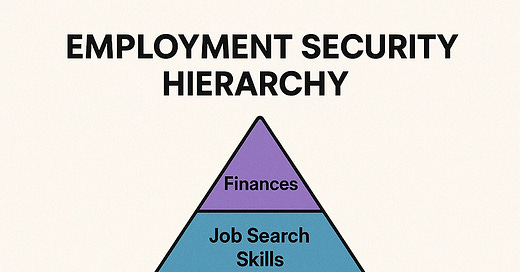Job Performance builds on having good skills to do the job
Job Performance is the next layer up of the Employment Security Hierarchy
The second level of The Cubicle Warrior Employment Security Hierarchy is Job Performance. Job performance is how well you use your skills to do the job compared to others with the same or a similar job. Note that this is not how you do the job, but how well you do the job compared to others.
I had a manager with this great job formula: job skills + job performance = opportunity. Everyone thinks that the only thing that counts is your job skills. But his point was that you can have all the skills in the world, but you won’t get any opportunities unless you perform excellently at work.
This newsletter focuses on helping knowledge workers navigate corporate America, from searching for jobs to working in the role, having employment security, and helping you become a Cubicle Warrior.
Navigating Corporate is a reader-supported publication. There are no investors. No sugar daddies. Just me. And the cats.
To receive new posts, become a free or paid subscriber.
Most people, including me, think they are doing a great job. It’s like a parent who thinks their child is the smartest kid in the world—until they hit first grade and all these other kids compete with them for the same grades; it is a zero-sum game.
And all those great credentials you have to do the job -- like the Project Manager Professional credential for a project manager -- do not mean you can do the work in a way that helps you differentiate yourself from others. It just means you have a credential. The world is filled with credentialed, methodology-driven individuals who fail daily at work. It’s not just the job skills; it's about how you use them to improve your job performance.
Job performance is about results
Job performance isn’t just about how you do the job but about the results you bring to the business. By “business,” I mean how your results help your manager meet his or her goals (and that includes a CEO position reporting to a Board of Directors as well, not just people who work in cubes). You could be a person who does data entry, but the accuracy of the work supports a customer goal for your manager, and that is a result worth touting.
All those business results make up your performance review. While your results are more important in finding a job outside the company, your performance review is important for keeping your job in certain kinds of layoffs at your company, for your ability to stay employed at your company by being offered opportunities for jobs in other departments, and for promotions because of your work. In other words, great performance reviews can support employment security inside the company for longer than poor performance reviews.
Your job performance is also affected by all those “soft” skills- your ability to work with a team, a manager, and others in the company as you do your work. If you are a person who constantly whines about the work, the working environment, and the company (even if everything you say is true), you won’t make the grade when it comes to performance review time. How you promote your ideas, shape ideas from others, and support the team are critical to successful job performance.
Skills and Performance can give you some job security
From an Employment Security hierarchy perspective, having good job skills and performance means you will get the maximum amount of job security (not Employment Security) you can have. But as I have noted, there is no job security. You can have the greatest skills in the world and be the top performer on your team -- and lose your job in a heartbeat when company management decides your department’s work is no longer valuable and the department is eliminated through layoffs. (See: DOGE).
Or another buys your company, and -- lucky you (not!) -- the buying company decides the department doing your work in their company is the one that will stay, and yours will go. Great job skills, great job performance -- but it doesn’t matter, you were in the wrong place at the wrong time -- so sorry.
This, of course, is why we want Employment Security, not Job Security.
Job Performance means:
How well you use your job skills to do the work
How your work impacts results for the company (or, more importantly, impacts the results of your manager)
How well the rest of the organization perceives your team (losers are losers, even if you are a top performer…)
How your work is perceived on a performance review (you need to be in the top 25% of your peers to have a shot at staying for certain types of layoffs or even being considered for transfers or promotions)
How well you deal with the infamous office politics. Business is social. It is thought to be data-driven, but it is not: it is social, and the data fits the social dynamics in the department and the company.
Skills + Performance = Opportunities
Having great job skills and performance will take you a long way in your career, especially when it comes to promotions and moving laterally in an organization. But it’s not enough to give you Employment Security. For that, you need to do more work. Next up: your Business Network.
Be a Cubicle Warrior,
Scot




